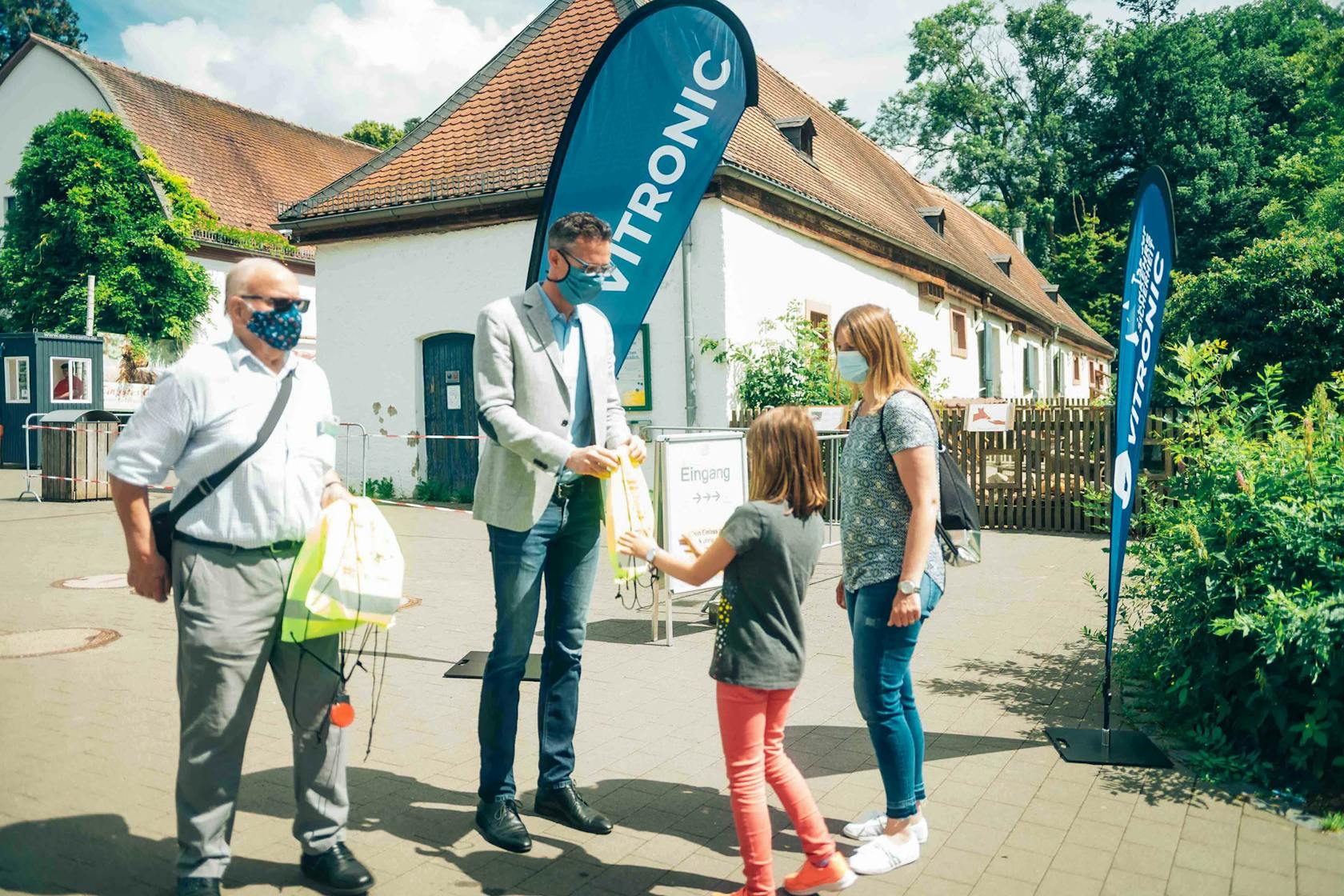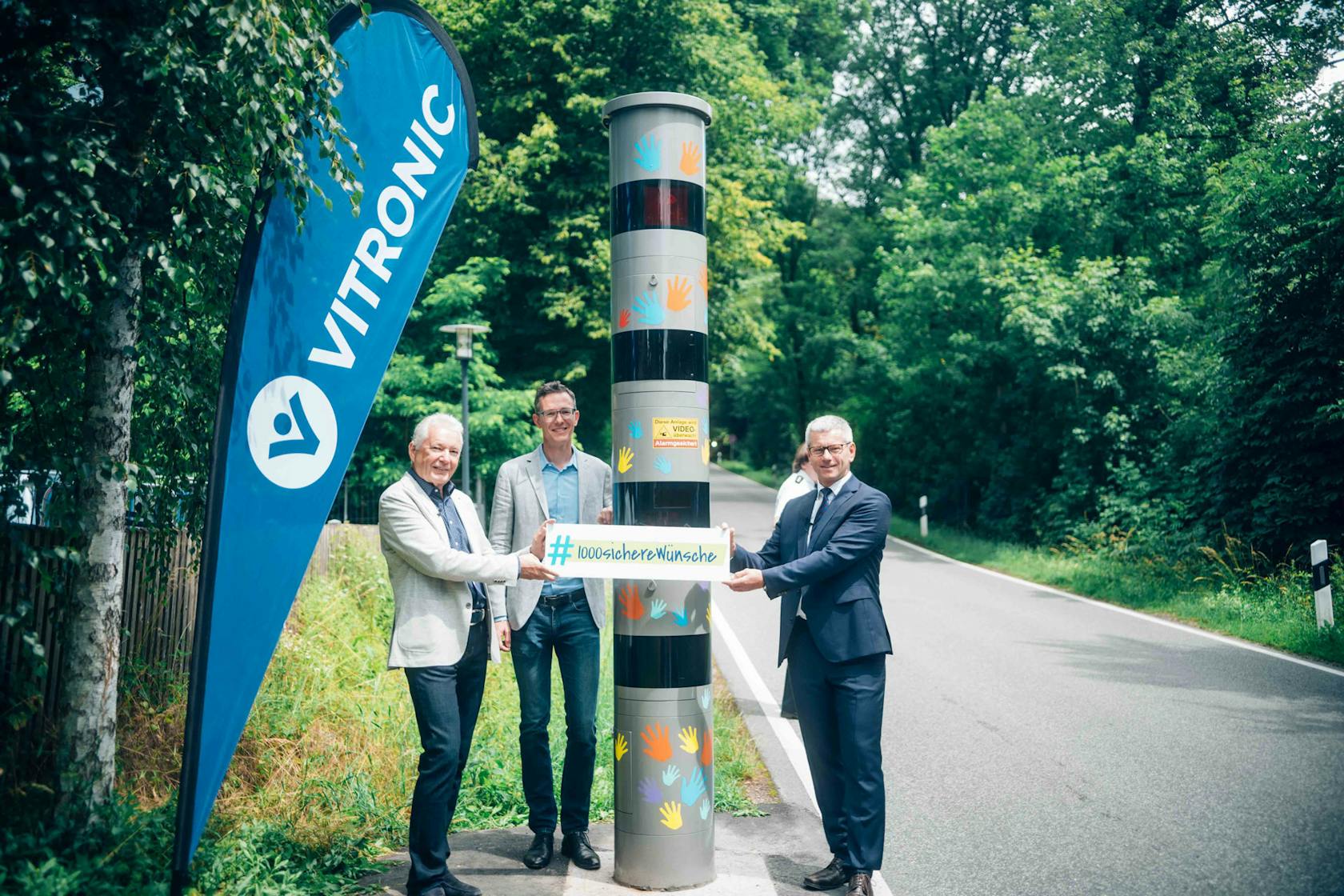

Towards Road SafetyTowards Road Safety
Our mission is to prevent accidents and protect all road users.
True to our motto, because we care, because we give back, VITRONIC is actively engaged in the community in our home city of Wiesbaden, Germany. To contribute the campaign Vision Zero, we donated a road safety camera to the City of Wiesbaden to be installed near the Fasanerie, a wildlife and botanical park.
Vision Zero in the German Road Safety Campaign
Since 2007, Vision Zero has been the guiding strategy for road safety in Germany. As followed by the German road safety council, DVR, the target for the campaign is to lower the number of fatalities and serious injuries on German roads to zero. Key to this strategy is the understanding that no human is perfect, so the laws, vehicles, roads, and services must be designed in such a way that mistakes by individuals do not have fatal consequences. Only then will it be possible to achieve Vision Zero
Our Contribution to Road Safety
VITRONIC has been a long-time member of the German road safety council (DVR), and Vision Zero is a part of our mission too. Our efforts are directed toward ensuring that everyone uses roads in a safe way. To this end, our speed enforcement systems are deployed throughout the world, serving a critical role in keeping roads safe and reducing the road death toll everywhere. A recent clear example of our dedication to our mission was the donation of a speed enforcement camera to the City of Wiesbaden.
The Fasanerie is a wildlife and botanical park in Wiesbaden, similar to a large zoo. This is a favorite destination for families, and sees many children visiting each day. The traffic on the road alongside this park is quite heavy, however, and this road is a speeding hotspot—a dangerous combination, given that visitors to the park are required to cross this road from the car park. Originally designed for 2500 vehicles per day, this road now sees up to 9000 vehicles drive past each day. By donating a speed enforcement system for this road, VITRONIC hopes to make the area safer for families and children.
With the wonderful speed camera pillar from VITRONIC, we are able to remind drivers to slow down to 40 km/h for this section, to not expose park guests to unsafe risks
The handover was overseen by VITRONIC founder Dr. Norbert Stein and CEO Daniel Scholz-Stein. To aid road safety for even the youngest park guests, we handed out brightly lit-up and reflective backpacks to children at the park, together with the ”Verkehrswacht” from Wiesbaden. Wearing these backpacks, we hope to make the roads safer for these children following their visit to the park.
The Fasanerie has a special place in the hearts of many people at VITRONIC.
I have been visiting the Fasanerie with enthusiasm for many years, first with my children, now with my grandchildren. It has been my heartfelt wish for years to make the roads at this wildlife and animal park safer to protect the lives of children
The donated speed enforcement system quickly showed both its necessity and positive consequences. The highest offense measured at the site was for a driver travelling at 97 km/h in this 40 km/h zone, but since its installation, the number of infringements has already fallen to around ten per day, according to the City of Wiesbaden. The desired effect, that drivers keep a safer speed through the pedestrian crossing to the park, is already being achieved.
With this example, it is easy to see that speed enforcement is more than just a source of income—it protects lives. And first among those: the lives of our children.
What criteria are used in selecting speed camera sites?
Enforcement systems are placed wherever road dangers are evident, and accidents keep occurring. They are especially placed at sites where pedestrians need special protection from the dangers of roads: near nurseries, primary schools, hospitals, nursing homes, pedestrian crossings, and bus stops. Should accidents repeatedly occur under similar circumstances, the site is reviewed by an accident committee. This committee then considers how to mitigate the dangers—with improved signage, a higher-traction road surface, or indeed with a speed enforcement system, for example.
Making Roads Safer: Progress in the Statistics
In 2019, the German road death toll saw a 7% reduction from the year 2018, to 3046 people. This is the lowest it has been on record—in over 60 years. This is absolutely a success! Still, decision-makers and road users should see this as just one step toward reaching zero road fatalities.
Around one third of the road fatalities in 2019 were the result of speed-related accidents, 963 people in total. A further 53,687 were injured in speed-related accidents, 13,769 of these seriously injured. Comparing these numbers to those in 2010, the total number of fatalities is 16.5% lower, and the number of speed-related deaths is a staggering 33% lower (down from 1441 in 2010).
Enforcing Safe Speeds Means Saving Lives
It is a common complaint that speed cameras are placed wherever the state can make the most revenue from speeding tickets. But this is not the case! In Germany, speed enforcement sites are published in the media, and in other countries can even be signposted. If it were only about the money, this transparency would be to the state’s detriment. Of course frustrations about finding a speeding ticket in the mail are understandable. But speed enforcement is about more than just money: it is about road safety, keeping people safe to save lives.

